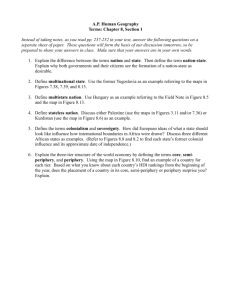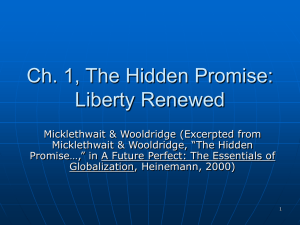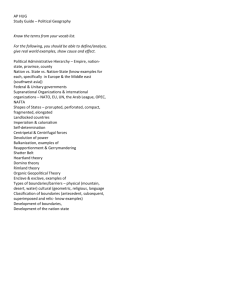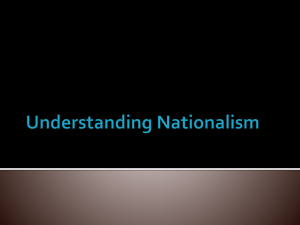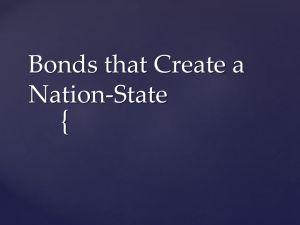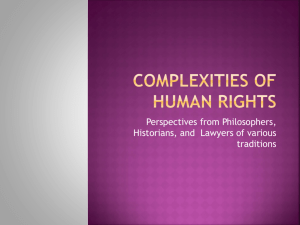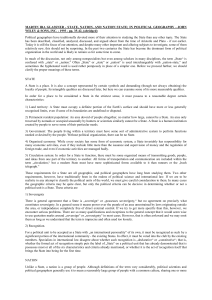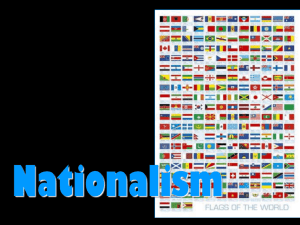(A) 1. State, Nation and the Nation-State
advertisement
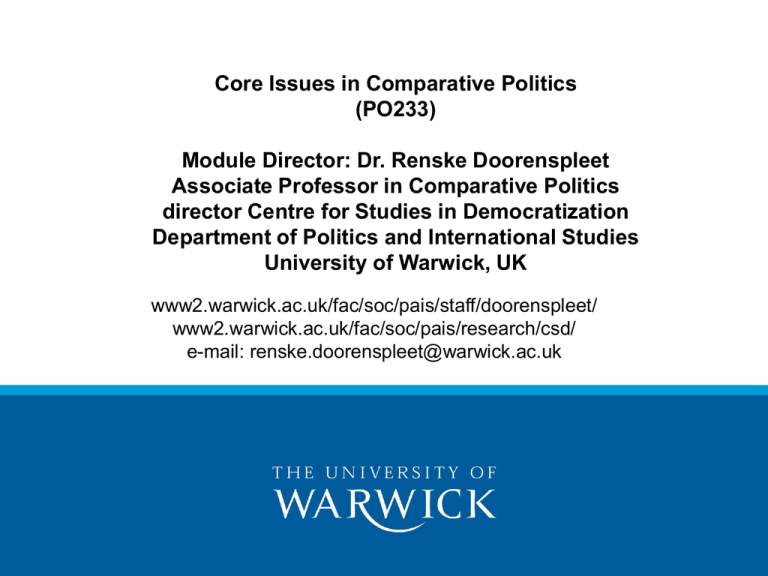
Core Issues in Comparative Politics (PO233) Module Director: Dr. Renske Doorenspleet Associate Professor in Comparative Politics director Centre for Studies in Democratization Department of Politics and International Studies University of Warwick, UK www2.warwick.ac.uk/fac/soc/pais/staff/doorenspleet/ www2.warwick.ac.uk/fac/soc/pais/research/csd/ e-mail: renske.doorenspleet@warwick.ac.uk Content Lecture & Seminar week 7 (A) Lecture week 7 (B) Seminar week 7 (C) Information lecture/seminar week 8 (D) interesting statements on basis of lecture and seminar week 7 (A) Lecture week 7 lecture: 1. State, Nation and the Nation-State 2. Globalization and the Future of the Nation-State (A) 1. State, Nation and the Nation-State (A) 1. State, Nation and the Nation-State (A) 1. State, Nation and the Nation-State Dalai Lama: "As I have often said, Tibet belongs to Tibetans, and especially to those who are in Tibet." (A) 1. State, Nation and the Nation-State State: Max Weber: "....ein auf das Mittel der legitimen (das heisst: als legitim angesehenen) Gewaltsamkeit gestütztes Herrschaftsverhältnis von Menschen über Menschen" [ "a relation of men dominating men, a relation supported by means of legitimate (i.e. considered to be legitimate) violence" - Max Weber: Politik als Beruf, 1919 ] (A) 1. State, Nation and the Nation-State State (Weber; see also Poggi 2008): 1. Territory 2. People (nation or nations) 3. Monopoly on exercise of force 4. Legitimacy, as perceived by the governed 5. Sovereignty - Control over a territory – internal and external (6. international recognition, e.g. by the UN) (A) 1. State, Nation and the Nation-State A state? (A) 1. State, Nation and the Nation-State A state? (A) 1. State, Nation and the Nation-State A state? (A) 1. State, Nation and the Nation-State Nation (Anderson 1991; see also Poggi 2008): The social construction of a collective identity; An imagined political community [that is] imagined as both inherently limited and sovereign (A) 1. State, Nation and the Nation-State Nation (Anderson 1991; see also Poggi 2008): 1. Imagined because members have mental image of their affinity 2. Limited, as nations have "finite, if elastic boundaries, beyond which lie other nations“ 3. sovereign insofar as no dynastic monarchy can claim authority over them (A) 1. State, Nation and the Nation-State Nation (Anderson 1991; see also Poggi 2008): 4. Finally, a nation is an imagined community because "regardless of the actual inequality and exploitation that may prevail in each, the nation is always conceived as a deep, horizontal comradeship. Ultimately it is this fraternity that makes it possible, over the past two centuries, for so many millions of people, not so much to kill, as willingly to die for such limited imaginings. (A) 1. State, Nation and the Nation-State Creation Nation: possible because of "print-capitalism“ (Anderson 1991) Creation State: - Three main phases in Europe (Poggi 2008, pp. 96-104) - Five paths in state formation (Daalder 1991, see Poggi 2008, p. 93) (A) 2. Globalization & Future of the Nation-State concept of sovereign nation-states is increasingly being challenged by globalization Globalization is a contested concept. There are three positions in the debate (see Sorensen 2008, pp. 604-606; also for definitions): 1. Retreat of the state position: States are losing power and influence. 2. The state-centric position: States have even managed to expand their capacities for regulation and control. 3. Pragmatic position: Process of state transformation. States are “winning” and “losing” at the same time. (A) 2. Globalization & Future of the Nation-State Sorensen (2008) argues that modern states are based on: (1) National economy: Removal of local barriers to trade and the building of a nation-wide infrastructure (2) National government: A centralized system of democratic rules and strong political-administrative capacities within a precisely defined territory (3) Nation: People who build a community of sentiment and a community of citizens (4) Sovereignty: No final political authority outside or above the state. (A) 2. Globalization & Future of the Nation-State However, according to Sorensen (2008) these characteristics are transformed by globalization (1) The economy is increasingly embedded in cross-border networks. “Shallow and deep integration” (2) National government is replaced by multi-level governance (A) 2. Globalization & Future of the Nation-State (continued) (3) Nation: Globalization reinforces collective identities “above” and “below” the nation. There is evidence of an emerging “western civic identity” but also of “resistant identities”. (A) 2. Globalization & Future of the Nation-State (continued) (4) Sovereignty: the rule of non-intervention is challenged in a world of multilevel governance. But still consent of states needed! States in process of transformation: “post-modern” states. (B) Seminar week 8 1. Choose two countries and try to find our whether they are nation-states as well 2. Collect ‘national symbols’ (1 or 2) or ‘nationalistic items’ (1 or 2) of your own country, or of another country you are interested in 3. Discussion during seminar (see points above) (D) interesting statements on the basis of lecture and seminar week 7 •The concepts of ‘nation’, ‘state’ and ‘nation-states’ are different and should not be used interchangeably •The nation-state is a distinctive ‘Western story’ which was transposed to the rest of the world •The core concept of sovereign nation-states is increasingly being challenged by globalization •Globalization is a contested concept •States continue to be utterly significant for any kind of political or social analysis •The changing modalities of statehood places the discipline of CP in a new setting

